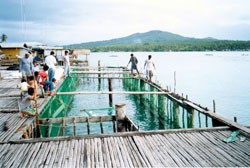
In Mindanao, the second-larges island of the Philippines, the minority Muslim population has historically suffered from poverty. The 1960s witnessed the emergence of the Moro National Liberation Front (MNLF), a militant group which fought for greater autonomy for the Muslim minority. In 1996, the MNLF and the Government of the Philippines signed a peace agreement. USAID, along with the Philippine Government and the MNLF, has been working to try to encourage faster economic development in the region to consolidate the peace.
A problem that can arise when a sizable insurgent group lays down its arms is that thousands of former fighters are suddenly unemployed. USAID responded to this problem by creating its “Arms to Farms” program, under which some 28,000 former combatants were provided with all the inputs and training they needed to become small-scale commercial farmers of corn, rice, or seaweed. Moving beyond this successful effort, USAID is now working with some 800 of the former combatants-turned-seaweed-farmers to help them add fish farming to their sources of income. Using existing seaweed-drying platforms, which are normally built out over the water on stilts, USAID is helping the farmers also produce high-value fish like grouper, snapper, and sea bass. Fish cages are constructed by simply attaching nets to the existing stilts that support the seaweed-drying platforms.
USAID also helped the former fighters successfully sell their products by showing them how to form a marketing association and linking them with regional traders. A representative of the association, Bol Salim, applauded the USAID effort, saying: “We knew that fish for export were commanding high prices in Zamboanga City, but we didn’t know how to take advantage of the market. Now, with the program’s help, we are culturing and selling high-value fish.” By helping former combatants develop the means of making a reasonable living for themselves and their families, USAID is promoting peace in the region.







Comment
Make a general inquiry or suggest an improvement.